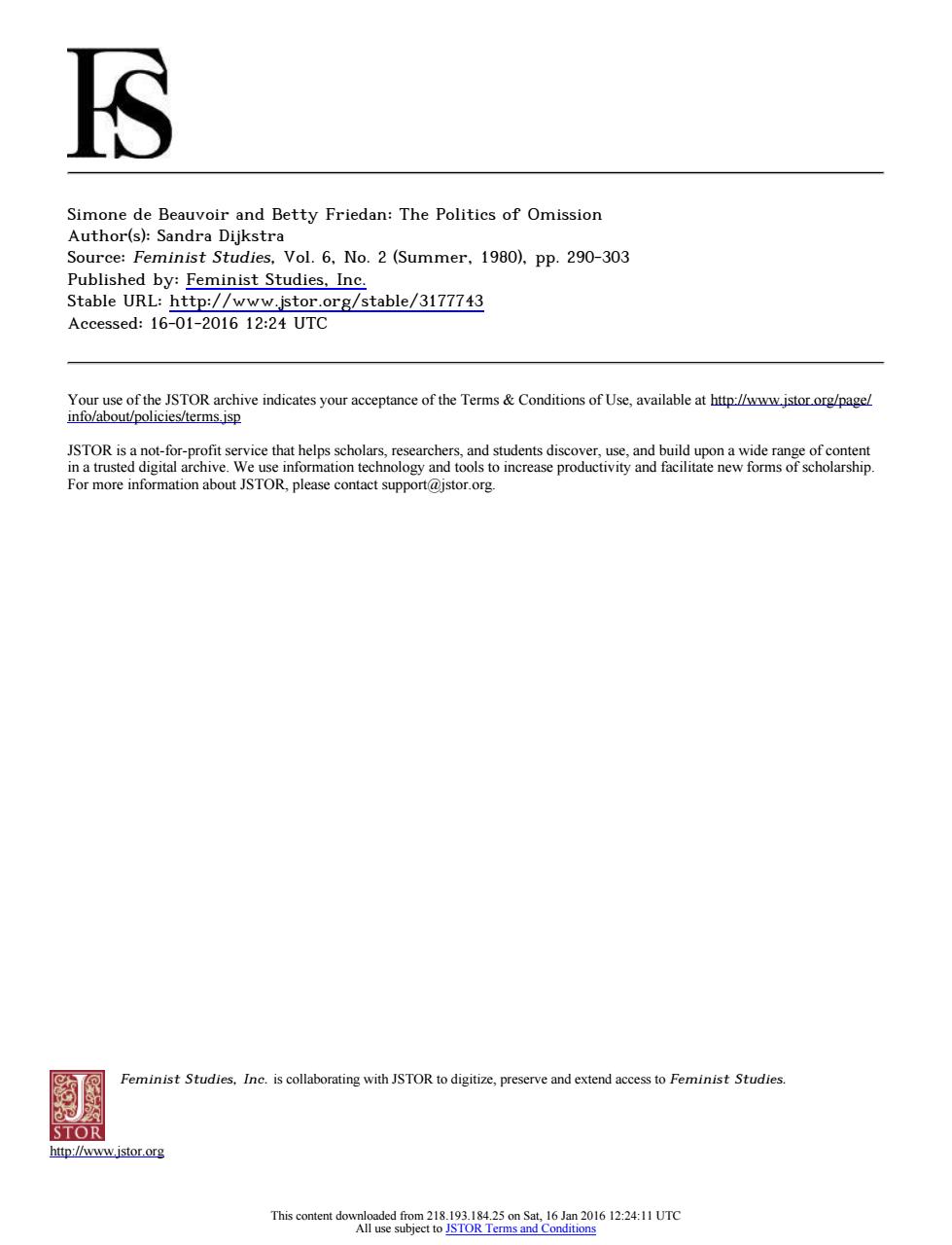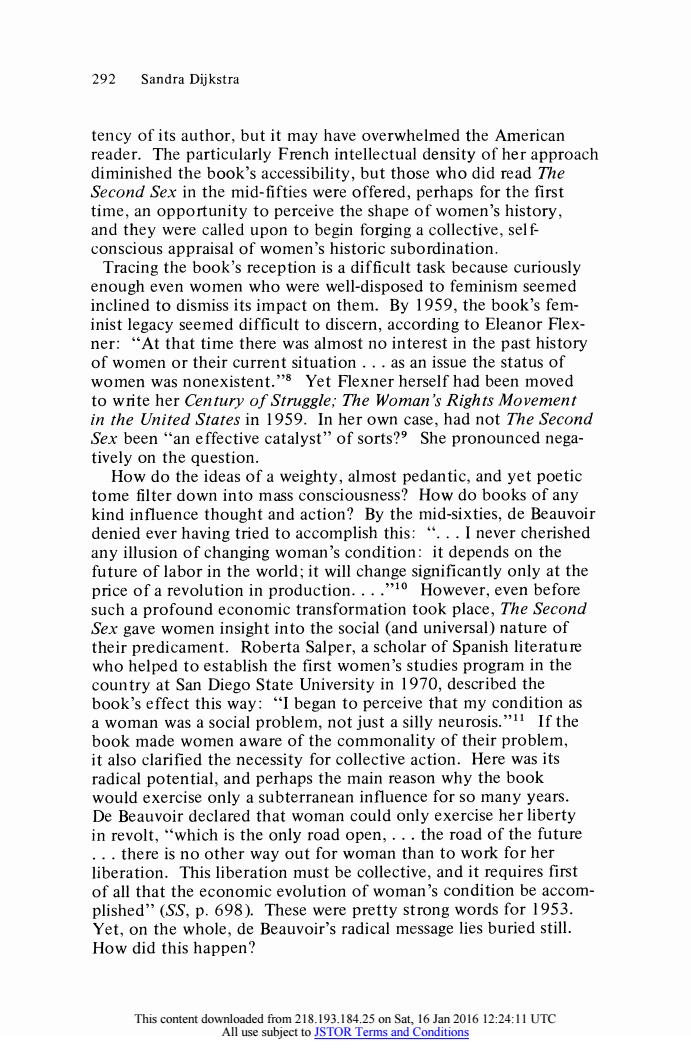
S Simone de Beauvoir and Betty Friedan:The Politics of Omission Author(s):Sandra Dijkstra Source:Feminist Studies,Vol.6,No.2 (Summer,1980),pp.290-303 Published by:Feminist Studies.Inc. Stable URL:http://www.jstor.org/stable/3177743 Accessed:16-01-2016 12:24 UTC Your use of the JSTOR archive indicates your acceptance of the Terms Conditions of Use,available at http://www istororg/pagel info/about/policies/terms.isp JSTOR is a not-for-profit service that helps scholars,researchers,and students discover,use,and build upon a wide range of content in a trusted digital archive.We use information technology and tools to increase productivity and facilitate new forms of scholarship. For more information about JSTOR,please contact support@jstor.org. Feminist Studies,Inc.is collaborating with JSTOR to digitize,preserve and extend access to Feminist Studies. STOR http://www.jstor.org This content downloaded from 218.193.184.25 on Sat,16 Jan 2016 12:24:11 UTC All use subject to JSTOR Terms and Conditions
Feminist Studies, Inc. is collaborating with JSTOR to digitize, preserve and extend access to Feminist Studies. http://www.jstor.org Simone de Beauvoir and Betty Friedan: The Politics of Omission Author(s): Sandra Dijkstra Source: Feminist Studies, Vol. 6, No. 2 (Summer, 1980), pp. 290-303 Published by: Feminist Studies, Inc. Stable URL: http://www.jstor.org/stable/3177743 Accessed: 16-01-2016 12:24 UTC Your use of the JSTOR archive indicates your acceptance of the Terms & Conditions of Use, available at http://www.jstor.org/page/ info/about/policies/terms.jsp JSTOR is a not-for-profit service that helps scholars, researchers, and students discover, use, and build upon a wide range of content in a trusted digital archive. We use information technology and tools to increase productivity and facilitate new forms of scholarship. For more information about JSTOR, please contact support@jstor.org. This content downloaded from 218.193.184.25 on Sat, 16 Jan 2016 12:24:11 UTC All use subject to JSTOR Terms and Conditions

SIMONE DE BEAUVOIR AND BETTY FRIEDAN: THE POLITICS OF OMISSION SANDRA DIJKSTRA The thirtieth anniversary of Simone de Beauvoir's The Second Sex has recently been commemorated at a conference in New York,but the effort to understand the book's contribution to feminist thought and to assess its effect on this generation of American feminists has only begun.'At this juncture,it seems crucial to ask:Why did Betty Friedan,and not Simone de Beau- voir,become the prophet of women's emancipation in America? On many levels,Friedan's book,The Feminine Mystique,appears to be a deradicalized and pragmatic rather than a theoretic reading of a similar problematic,women's situation.2 By examining the process by which Friedan (consciously or unconsciously)"trans- lated"the 1949 text,we can more clearly perceive the radical message of The Second Sex,which still remains the only thorough attempt to fathom the situation of modern women from a histor- ical,economic,psychological,sociological,and literary perspective. Social,economic,and political conditions as well as intellectual and ideological predilections prepared American women and the American media to better receive The Feminine Mystique.In 1953 when The Second Sex first appeared in translation in Amer- ica,it had to contend with a number of obstacles.The country was entering the silent,fearful fortress of the McCarthy years, and de Beauvoir was suspected of Marxist sympathies,despite her stance as an existentialist and her critique of Engels's "eco- nomic monism."3 Readers of The Nation,a generally liberal mag- azine,were warned to be wary of"certain political leanings"of the author.4 It seems that de Beauvoir's study of"the peculiar nature"of woman's oppression was too radical for America in the fifties (SS,p.64).Her conclusion,that change in woman's eco- nomic condition,though insu fficient by itself,"remains the basic factor,"was unacceptable (SS,p.807).Although de Beauvoir her- self would later criticize the unmaterialist.abstract nature of her Feminist Studies 6,no.2 (Summer 1980).1980 by Feminist Studies,Inc. This content downloaded from 218.193.184.25 on Sat,16 Jan 2016 12:24:11 UTC All use subject to JSTOR Terms and Conditions
This content downloaded from 218.193.184.25 on Sat, 16 Jan 2016 12:24:11 UTC All use subject to JSTOR Terms and Conditions

Sandra Dijkstra 291 early feminist statement,in 1953 it seemed too concrete for Amer- ican taste. In addition to this ideological barrier,The Second Sex encount- ered still another ideological obstacle.By the end of the New Deal, its vision of public salvation was being replaced by a more individu- alistic ethic.The middle-class American exodus to the suburbs and the retreat into the domain of private happiness were underway. With the return of the soldiers,women's participation in the work force was discouraged.One of the strongest sections of Friedan's book is her documentation of the effort to reintroduce the cult of true womanhood.She amply describes the way in which full-time motherhood was lauded as woman's true profession,and career is viewed as deviant or evil (FM,p.40). Yet,the postwar retreat of women into domesticity was not as universal as Friedan would have us believe.Although the fifties bore witness to a revitalization of family life and to a baby boom, it was also marked by a doubling of women's employment outside the home.The most striking feature of the period was the degree to which women continued to enter the job market.s In spite of the media's designation of woman as"housewife-mother,"many women were rejecting this role in daily life (FM,p.38).Or,if not, they were subject to a new phenomenon,diagnosed by sociologists of the period as"role conflict."7 Perhaps more than other factors, this disparity between the dominant cultural model of womanhood and the actual economic role of women would lead to the rebirth of feminism. Did The Second Sex have any impact at all in the fifties?Al- though de Beauvoir recommended economic autonomy for wom- en and praised the independent woman,it is doubtful that her message provided the stimulus for women's entry into the job market.Economic factors were responsible for that. In addition,de Beauvoir's book was not really designed to reach the masses.Had she published an easy-to-read manual with prac- tical advice,its impact would have been more immediate and more perceptible.But trained in philosophy,de Beauvoir had more ab- stract premises and loftier intentions.She wanted to explore the condition of womanhood and began by asking,on page xv,the fundamental question:"What is a woman?"Her purpose was nothing less than to analyze woman's historic submission to the male sex and to find out how it all began.Her goal was to dis- cover:"How can a human being in woman's situation attain ful- fillment?"(SS,p.xxvii).Reaching back to ancient sources for evidence,this philosophical treatise based on psychoanalytic and materialist methodologies testified to the seriousness and compe- This content downloaded from 218.193.184.25 on Sat,16 Jan 2016 12:24:11 UTC All use subject to JSTOR Terms and Conditions
This content downloaded from 218.193.184.25 on Sat, 16 Jan 2016 12:24:11 UTC All use subject to JSTOR Terms and Conditions

292 Sandra Dijkstra tency of its author,but it may have overwhelmed the American reader.The particularly French intellectual density of her approach diminished the book's accessibility,but those who did read The Second Sex in the mid-fifties were offered,perhaps for the first time,an opportunity to perceive the shape of women's history, and they were called upon to begin forging a collective,self conscious appraisal of women's historic subordination. Tracing the book's reception is a difficult task because curiously enough even women who were well-disposed to feminism seemed inclined to dismiss its impact on them.By 1959,the book's fem- inist legacy seemed difficult to discern,according to Eleanor Flex- ner:"At that time there was almost no interest in the past history of women or their current situation...as an issue the status of women was nonexistent."8 Yet Flexner herself had been moved to write her Century of Struggle;The Woman's Rights Movement in the United States in 1959.In her own case,had not The Second Sex been"an effective catalyst"of sorts?9 She pronounced nega- tively on the question. How do the ideas of a weighty,almost pedantic,and yet poetic tome filter down into mass consciousness?How do books of any kind influence thought and action?By the mid-sixties,de Beauvoir denied ever having tried to accomplish this:"..I never cherished any illusion of changing woman's condition:it depends on the future of labor in the world;it will change significantly only at the price of a revolution in production...."1 However,even before such a profound economic transformation took place,The Second Sex gave women insight into the social (and universal)nature of their predicament.Roberta Salper,a scholar of Spanish literature who helped to establish the first women's studies program in the country at San Diego State University in 1970,described the book's effect this way:"I began to perceive that my condition as a woman was a social problem,not just a silly neurosis."If the book made women aware of the commonality of their problem, it also clarified the necessity for collective action.Here was its radical potential,and perhaps the main reason why the book would exercise only a subterranean influence for so many years. De Beauvoir declared that woman could only exercise her liberty in revolt,"which is the only road open,...the road of the future ..there is no other way out for woman than to work for her liberation.This liberation must be collective,and it requires first of all that the economic evolution of woman's condition be accom- plished"(SS,p.698).These were pretty strong words for 1953. Yet,on the whole,de Beauvoir's radical message lies buried still. How did this happen? This content downloaded from 218.193.184.25 on Sat,16 Jan 2016 12:24:11 UTC All use subject to JSTOR Terms and Conditions
This content downloaded from 218.193.184.25 on Sat, 16 Jan 2016 12:24:11 UTC All use subject to JSTOR Terms and Conditions

Sandra Dijkstra 293 A partial answer can be found by examining Betty Friedan's The Feminine Mystique.Once economic conditions were ripe for a mass movement,The Second Sex needed a"translator'' who could boil down its ideas,and its theory,into less radical, more readable journalese,so that its message could be transmitted to the masses,at least partially.For the "lady with a lance,"as de Beauvoir had been called by the Time magazine reviewer,with her"alarmed male mind"(in the words of the Newsweek writer), had raised important questions.12 Exactly ten years separates the English translation of The Second Sex from its first illegitimate offspring,The Feminine Mystique. And it took Friedan another twelve years to own up to the rela- tionship.In the Pre face and Acknowledgments to the first edition of 1963,Friedan acknowledged her debts to scores of individuals, but de Beauvoir's name was notably absent.The entire project, Friedan pointed out in her opening words,was born out of a "personal question mark"which led her in 1957 to survey her Smith College classmates (FM,p.7).Later,on page 345 of the book,she admitted that she was "asked to do an alumnae ques- tionnaire...(my emphasis).Friedan claimed to have undergone an individual awakening,a realization for which"a Frenchwoman named Simone de Beauvoir,"as she described her predecessor, need get no credit(FM,p.14).Friedan would later call de Beau- voir"an intellectual heroine of our history."13 But in 1963,she presented her only through the words of a male American critic who charged that de Beauvoir"didn't know what life was all about,”and“besides she was talking about French women”(FM, p.14).Instead of acknowledging de Beauvoir's influence,Friedan left this critical presentation standing as evidence of the general problem that existed by the end of the fifties:"Words like 'eman- cipation'and 'career'sounded strange and embarrassing;no one had used them for years"(FM,p.14).14 Thus,her own discovery seemed all the more portentous and original,and American read- ers were left with a much less weighty and less subversive book, and a new mystique,"the problem that has no name"(FM,p.11). Finally,in a 1975 interview with de Beauvoir,Friedan felt com- pelled to pay her intellectual debt,at least partially.She admitted that she,Betty Friedan,"who had helped start women on the new road"had been herself"started on that road"by de Beau- voir.15 When it came to specifying the nature of the influence, Friedan demurred,reluctantly avowing that she had"learned my own existentialism from her....[This]led me to whatever original analysis of women's existence I have been able to contribute...." The Second Sex had instructed her in existentialism,not in femin- This content downloaded from 218.193.184.25 on Sat,16 Jan 2016 12:24:11 UTC All use subject to JSTOR Terms and Conditions
This content downloaded from 218.193.184.25 on Sat, 16 Jan 2016 12:24:11 UTC All use subject to JSTOR Terms and Conditions